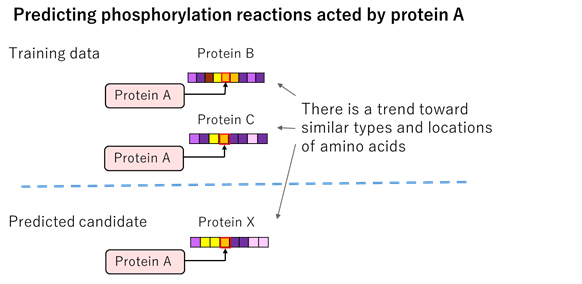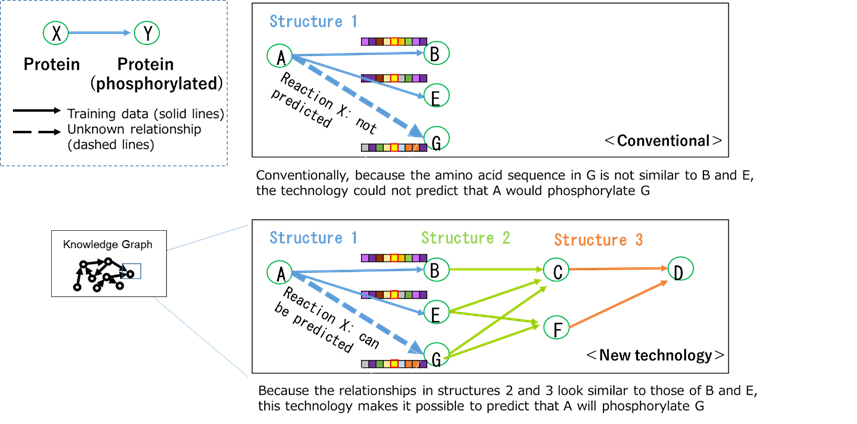Archived content
NOTE: this is an archived page and the content is likely to be out of date.
Fujitsu Develops Technology to Predict Biochemical Reactions, Clarifying the Mechanisms of Genetic Disorders
Advancing new drug discovery and precision medicine with the ability to predict large volumes of unknown chemical reactions
Fujitsu Laboratories Ltd.,The Insight Centre for Data Analytics,Fujitsu (Ireland) Limited
-
[1] The Insight Centre for Data Analytics
A data analytics research institution, one of the largest in Europe, run by Science Foundation Ireland. The Insight Centre has several locations in Ireland, but this announcement is in regard to a joint research conducted with its location at the National University of Ireland Galway.
-
[2] Knowledge graph
A dataset that uses connections representing relationships between information collected from a variety of information sources.
-
[3] Precision medicine
A new style of medicine that prevents and treats diseases with consideration of individual differences in genetic information, living environment, and lifestyle.
-
[4] Evaluation data
PhosphoSitePlus(*) , a database of phosphorylation reactions, and UniProt, a database of protein sequences.
(*) Hornbeck PV, Zhang B, Murray B, Kornhauser JM, Latham V, Skrzypek E PhosphoSitePlus, 2014: mutations, PTMs and recalibrations. Nucleic Acids Res. 2015 43:D512-20. -
[5] Systems Biology Ireland
A systems biology research institution specialized in the study of cellular information transmission, with a focus on developing new treatment strategies for cancer.
About Fujitsu
Fujitsu is the leading Japanese information and communication technology (ICT) company, offering a full range of technology products, solutions, and services. Approximately 140,000 Fujitsu people support customers in more than 100 countries. We use our experience and the power of ICT to shape the future of society with our customers. Fujitsu Limited (TSE: 6702) reported consolidated revenues of 4.1 trillion yen (US $39 billion) for the fiscal year ended March 31, 2018. For more information, please see www.fujitsu.com.
About Fujitsu Laboratories
Founded in 1968 as a wholly owned subsidiary of Fujitsu Limited, Fujitsu Laboratories Ltd. is one of the premier research centers in the world. With a global network of laboratories in Japan, China, the United States and Europe, the organization conducts a wide range of basic and applied research in the areas of Next-generation Services, Computer Servers, Networks, Electronic Devices and Advanced Materials. For more information, please see: http://www.fujitsu.com/jp/group/labs/en/.
About The Insight Centre for Data Analytics
The Insight Centre for Data Analytics is one of Europe’s largest data analytics research organisations, with 400+ researchers, more than 80 industry partners and over €100 million of funding. Insight is made up of four main centres: Insight@DCU, Insight@NUI Galway, Insight@UCC and Insight@UCD as well as a number of affiliated bodies. Each of Insight's main centres has a long track record of data analytics research. In July 2013 they came together under Science Foundation Ireland as Insight. The size of the centre allows for collaboration on a large scale, which enables the organisation to compete for funding and opportunities at a much higher level.
Technical Contacts
Artificial Intelligence Laboratory
Knowledge Technology Project
![]() E-mail: kg-query@ml.labs.fujitsu.com
E-mail: kg-query@ml.labs.fujitsu.com
Company:Fujitsu Laboratories Ltd.
Technical Contacts
Vit Novacek
![]() E-mail: vit.novacek@insight-centre.org
E-mail: vit.novacek@insight-centre.org
Company:The Insight Centre for Data Analytics
Press Contacts
Louise Holden/Grainne Faller
![]() E-mail: info@fhmediaconsulting.com
E-mail: info@fhmediaconsulting.com
Company:The Insight Centre for Data Analytics
All company or product names mentioned herein are trademarks or registered trademarks of their respective owners. Information provided in this press release is accurate at time of publication and is subject to change without advance notice.
Date: 31 October, 2018
City: Kawasaki, Japan
Company:
Fujitsu Laboratories Ltd. ,The Insight Centre for Data Analytics ,Fujitsu (Ireland) Limited

